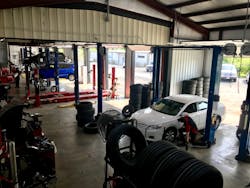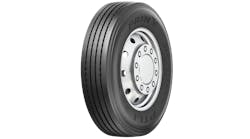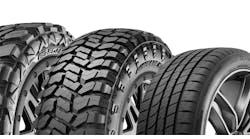MTD recently contacted several independent tire dealers to find out how they are reacting to the coronavirus outbreak and subsequent government actions. “This represents uncharted waters for us,” says John Ziegler, vice president of Massillon, Ohio-based Ziegler Tire & Supply Co. Here’s how dealers are managing through this unprecedented crisis.
“We want to keep everyone safe’
Ziegler Tire operates 18 commercial outlets, six retail stores and two distribution centers. “We don’t know what’s going to happen down the road,” says John Ziegler. “Obviously, the key is the well-being and safety of everybody, including our employees, customers and anyone we come in contact with.”
Ziegler Tire employees are taking measures to tamp down the possible spread of the virus by “washing hands constantly. If, by chance, any employee has a symptomatic issue, we want them to get checked and stay in touch with us. We want to keep everyone safe. That’s our number-one priority.”
That includes the company’s fleet customers. “We’re dropping off products in customers’ yards and emailing invoices to them just to maintain space between people,” he says. “Obviously, a road service call still requires getting out there and getting tires changed but we’re trying to reduce the amount of contact as much as possible. We’re doing whatever is necessary to keep trucks moving so people can get what they need.”
Ziegler believes that the economic fall-out from the outbreak could have more of an impact on Ziegler Tire’s retail business. “Car count at our retail stores has been a little soft,” he says. “This is the time of the year when things start firing up. I do believe it will impact our retail business because of the precautions that people will – and should – take,” such as deferring non-essential car maintenance and repairs. “It’s a wait-and-see (situation.) All we can do is pray for a quick resolution.”
‘Trying to be proactive’
Three days after officials confirmed a case of COVID-19 in Campbell County, Tenn., Brandon Johnson, general manager of Eagle Tire Pros, says the family-owned dealership is “trying to be proactive and is operating out of an overabundance of caution.”
The single-store, nine-bay operation so far hasn’t seen a slowdown in business, but “we’re looking for ways to prepare for that.” The store typically services about 1,000 cars a month.
“Anytime something hits at home, it becomes a little more real,” Johnson said.
The business has set an alarm to sound every hour. It’s a signal for employees to spray down every surface, from equipment in the bays to customer touchpoints in the lobby. Additionally, technicians are using sanitizer and washing their hands every time they get out of a customer’s vehicle.
Johnson says the store is continuing the availability of its small fleet of courtesy vehicles for customers, and the vehicles are being sanitized between each use. Eagle Tire Pros also offers a courtesy pick-up and drop-off service. “We don’t have Uber in our town, so we’re used to providing all the services for our customers.”
Online, the store even offered a roll of toilet paper with the purchase of every set of tires. It was meant to add some lighthearted fun to the frenzy, but Johnson said if someone really needed toilet paper, he’d help them out. “We bought some extra.”
So far, aside from all the safety precautions, the coronavirus hasn’t had a big effect on his business. “So far we’ve not seen any snags in delivery or our supply chain,” he says. American Tire Distributors Inc. has maintained the store’s regular twice-a-day deliveries.
‘We all have skin in the game’
When contacted by MTD on March 16, Tom White, owner of Tire Source, a multi-location retail tire dealership based in Montrose, Ohio, was waiting to hear what Ohio Governor Mike DeWine was going to say during a mid-afternoon press conference.
“Was he going to tell non-essential businesses to close?” White wondered. “We’re talking with our business advisors and our accountants. Are we classified as an essential business or non-essential? We do a lot of work with the police departments” and other first responders. “Who will take care of their needs if we are told to close?
“A curfew at 8 p.m. would make sense, and it wouldn’t affect us much. This is new territory.”
White says walk-ins at his stores are off, and the phones are not ringing. He has told his employees, “If you don’t feel well, don’t come to work. Do not go to the emergency room or urgent care. Use Teladoc, (employees have 24/365 access to doctors via the phone, video or mobile app) and make sure you’re screened and let them tell you what direction to go.
“We’ve never dealt with something like this,” he adds. “Our controller is monitoring incoming information from our advisors. What’s our contingency plan? How long can you go without any revenue? We have to wait and see.
“The atmosphere is not great, but it’s not what I thought it would be like when I saw the market open up. I thought it would be sheer panic. Everybody understands what we’re dealing with, and it seems to be bringing people back together. We all have skin in the game. But there is no ‘how-to’ book for this.”
‘We’ve got cars in every bay’
In Richmond, Va., Mark Smith’s five Midas stores are offering service that requires no human interaction.
Smith says each of his stores offers loaner vehicles to customers. (His busiest stores have 23 loaner vehicles.) In light of the threat of the coronavirus, his company is offering to drive a loaner vehicle to a customer, pick up the car that needs service, perform the work and return the repaired vehicle — all without any personal interaction.
Customers just need to call a store, schedule the service and alert staff where to find their vehicles’ keys. Then Smith or one of his employees will drop off a sanitized vehicle for the customer to use. When they return the repaired vehicle, it’s sanitized, too.
After watching data released by the Centers for Disease Control (CDC), Smith thinks the worst of the effects of the virus are still to come. But in the meantime, business is brisk. “We’ve got cars in every bay in all five stores.”
He admits he has “some nervous techs,” so he’s making a point of visiting stores and talking one-on-one with employees each day. He’s also stressing basic safety steps: use of hand sanitizer, gloves, floor mats, and steering wheel covers, and washing hands often.
‘This is just the beginning’
Contacted one day after the Michigan Department of Health and Human Services announced the state’s 53rd confirmed coronavirus infection, Ray Ostrolecki, manager of Arandas Tire in Detroit, Mich., says reactions to the coronavirus outbreak are already causing “somewhat of a decline” in his dealership’s business.
Customers aren’t canceling appointments “but we’re seeing a lot less foot traffic. Monday is one of our busiest days and we’re seeing maybe 20%” less traffic than normal. “I think this is just the beginning, unfortunately.”
That said, some car repair services can’t be safely postponed, he says. “If you have to fix something, you have to fix it. That’s all there is to it.”
In the meantime, Ostrolecki and his staff have stepped up sanitary precautions at the store. “The last thing we want is for someone to get sick. Will the (outbreak) end next month? Will they come up with a miraculous cure? Will it drag on for three months? We don’t know.”
‘All we can do is be prepared’
Service calls have picked up at Atlanta Commercial Tire Inc. as area businesses adjust to the coronavirus emergency. The Forest Park, Ga.-based dealership operates nine stores and three retread plants in “The Peach State.”
“We’re staffing full-on service techs because power companies and utilities are implementing some type of readiness plan,” says Larry Faulkner, the dealership’s vice president.
Faulkner adds that his business is at the mercy of the market. “You can’t sell a tire unless someone needs it. All we can do is be prepared when we get a phone call to where we do not miss out on an opportunity to run a service call. That’s our best defense.”
The dealership completed six or seven service calls for customers it does not normally do business with this past weekend. The companies were running more miles than normal and had additional vehicles out on the road. Faulkner speculates they could not find service with their regular dealer, so the called Atlanta Commercial Tire. “We just have to make sure we’re staffed up and ready for that,” he says.
To help protect employees, the dealership's safety coordinator is distributing information to employees daily. The bullet points discuss social distancing, handwashing, and other steps. “We have soap everywhere,” says Faulkner.
Employees exhibiting symptoms of a coronavirus infection must remain home if already there or go home if at the workplace. “We made it very clear that if you feel sick in any way, by all means, stay at home,” says Faulkner.
The stringent requirement even applies to employees who likely have seasonal allergies. “In Atlanta, the pollen has started, so we have people who are getting a little cough and watery eyes. We’ve had to send some people home because of pollen allergies.”
Even during this public health crisis, Faulkner notes that grocery stores and home improvement stores are busy and emergency deliveries are being made on trucks. “I don’t know if it’s going to compensate for the slowdown in normal freight, but if people aren’t going out to eat, they’re still going to go to the grocery store. There are still a lot of deliveries being made to the grocery stores and the home improvement stores.”
He expects when business starts to return to normal, there will be a cascade effect as companies try to catch up. “We’re actually building our inventory now in anticipation of it being over and people ordering a lot of tires,” says Faulkner.
"Anything is possible'
Chris Mitsos, vice president of Mountain View Tire, which has 31 stores throughout southern California, says his management team “has been proactive in communicating to all of our stores, repeatedly, about following CDC guidelines…telling them we need to clean all touchpoints in the store three times a day, to avoid physical contact with customers and fellow employees, to make sure they wipe phones, computer keyboards and steering wheels of customers’ cars down – basic stuff. There’s only so much you can do.
“We’re just hoping that if there’s a national shutdown – which I believe there will be – that in California, they declare auto repair as an essential service," he says. "There’s no public transportation here so you have to use your car to get around. Doctors, nurses and first responders – all the people who have to work at gas stations and supermarkets – they need to be able to get their cars fixed if there’s a problem. I hope we will be allowed to stay open.
“And here’s the other part: if everything is shut down and you can’t go to restaurants or the movies, you might start looking at what you’ve been putting off. ‘Maybe it’s time to get my tires checked out? Maybe it’s time to have that oil change done?’ We have no idea what to expect at this point. Anything is possible.”
‘It will trickle down to us’
Steps taken so far by Gem City Tire Inc. to help prevent the spread of the coronavirus include sending medical professionals to meet with employees at every location. The dealership also set up a telephone hotline on March 16 to connect employees to a nurse who can answer virus-related questions.
“We’re concentrating on providing facts and not rumors, which is difficult at this point,” says Jeff Lecklider, president of the Dayton, Ohio-based commercial dealership, which has eight locations in Ohio and Indiana, plus a retread plant.
All Gem City Tire employees received a memo on Friday, March 13, outlining important phone numbers and procedures to protect themselves in their homes and workplaces. Lecklider notes that the nature of his dealership’s work means his employees aren’t operating in tight quarters.
“Most of our guys are in service trucks driving to the job, so they aren’t in big crowds of people and they aren’t dealing with the public,” he says. “We don’t have the general public in our facilities. We have truck drivers and a few customers on a daily basis.”
All Gem City Tire outlets have sanitizers, soaps, wipes and other items, thanks to the efforts of two employees who spent this past Friday making sure all locations were well-stocked.
It’s too early to talk about the long-term impact on business, according to Lecklider. Much depends on what happens at customers’ operations. He says if the coranavirus crisis is short-lived, Gem City Tire can weather the storm. “We just don’t know who all is going to be impacted and how hard. It will trickle down to us.”
The only similar situation Lecklider recalls in terms of uncertainty was 9/11. “That was more from a financial market situation than it was employees and customers,” he says. “This is pretty much unprecedented for everyone at Gem City Tire. We’re learning as we’re going and if anybody wants to call us and give us good advice, we're all ears.”
Stay tuned to MTD for ongoing coverage of the coronavirus' impact on the tire industry.
Click here for a recent special report.



